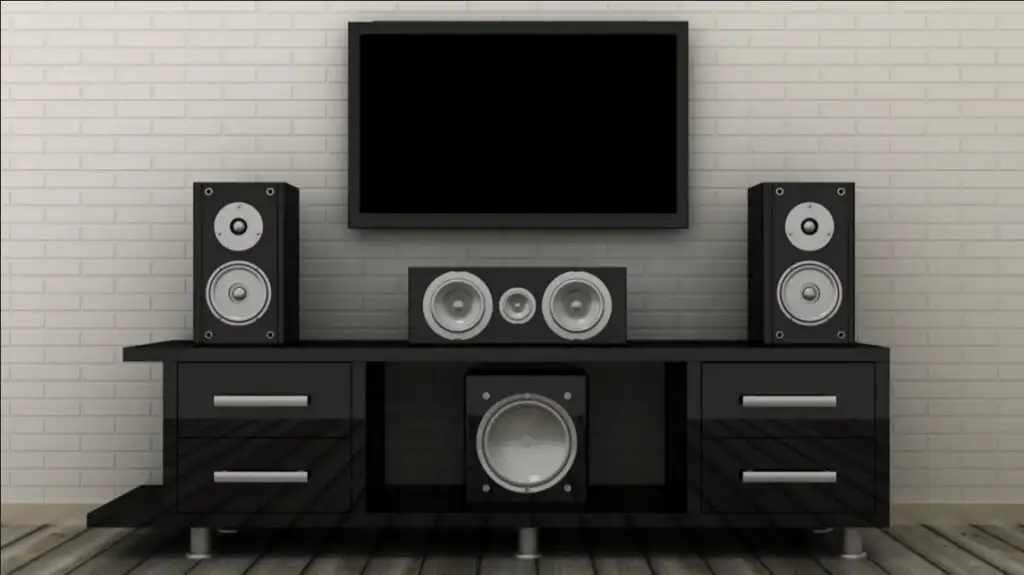A center channel speaker is what?
The center channel speaker, according to devotees of home theatre, is the most significant component of the entire surround sound setup. Why? Because this speaker is in charge of reproducing the discussion. Also, all of the audio from the action that is taking place in front of the viewer will be played.
When watching a movie, you should always sit squarely in front of the center channel speaker, which is always located directly above or below your TV. Without a dedicated center channel speaker, a home theatre setup is never complete.
Be careful when selecting the center channel speaker. You want the fullest possible immersion and high-quality audio.
If you have a soundbar, do you still need a central channel speaker?
The sound of your TV will sound better thanks to a soundbar, which is a standalone speaker. You only need to plug it into your TV to get started. But, it is in no way intended to replicate the movie sounds exactly as they were made.
A center channel speaker is necessary if you want a home theatre and surround sound system. It is a component of the sound system, which also includes two surround speakers and a center, left, and right speaker. Also, it will let you individually manage the volume of each channel. A center channel speaker, unlike a soundbar, needs an external AV receiver or at the very least a power amplifier that will power it.
Considerations for Center Channel Speaker Specs and Features
The addition of a center channel speaker can significantly enhance the overall sound if you don’t have a surround system and are using two respectable speakers for your home entertainment. You must understand what distinguishes one center channel speaker from the other, though, in order to select the one that best meets your demands. Below is a summary of the features and technical requirements you need to consider.
Power Output:
Without needing to hear the speaker, this will let you know how loud they are. The sonic possibilities of a center channel speaker with 200 Watts are greater than those of any other speaker with only 100 Watts. The speaker will be louder the higher the power output. This should be a key requirement to search for if you like loud music.
Driver size:
In this instance, larger is preferable. Simply said, larger drivers create clearer sounds than smaller ones. The sound quality will be considerably impacted by this.
Configuration ratio:
The configuration ratio statistics show the number of drivers and the presence of a subwoofer in a center channel speaker.
The speaker’s capacity to reproduce frequencies that a human can hear without discomfort is measured by its frequency response. It denotes a frequency range of 20Hz to 20kHz. You can enjoy both high- and low-frequency instrumental sounds if your center channel speaker has a wide frequency response.
Speaking of frequencies, a center channel speaker with a bi-wire capability has two sets of connections:
one for the high-frequency drivers and the other for the low-frequency drivers. You will be able to distinguish between all the high and low sounds thanks to the use of separate wires for the woofer and tweeter, which will guarantee crystal-clear audio.
You should choose if you want two, four, or more woofers because this is a matter of personal preference even though it is not a fundamental component of the speakers. The sound coverage increases with the number of center channel speakers. This implies that when you add more woofers, the size of the sweet spot in front of your TV will grow. But, be certain that your cabinet has enough space for all the woofers you desire.
Material:
The materials used in the construction of the speakers can have a big impact on how they sound. The best speakers frequently employ the best material that is available. For instance, compared to metal tweeters, which have a sharp sonic character, silk tweeters produce a smoother sound.
Read the warranty terms carefully before purchasing a center speaker. Sound systems often have a very long lifespan and are difficult to break. However, you want to make sure you’ll be able to repair it if your center speaker should ever becomes defective.
It’s crucial to match your speakers, especially if you’re extending an existing set with a central channel speaker. If at all feasible, try purchasing from the same manufacturer. This is crucial since different manufacturers build their speakers using varied components. The same manufacturer’s home theatre speakers will replicate sound and frequencies the same way. An example of this is a sound signature. When the sound shifts from one side of the setup to the other, it will provide a jarring effect due to a differing acoustic signature. Some speakers are incredibly adaptable and work well with others.
